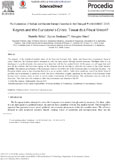| dc.contributor.author | Sklias, Pantelis | |
| dc.contributor.author | Roukanas, Spyros | |
| dc.contributor.author | Maris, Georgios | |
| dc.date.accessioned | 2015-12-05T10:56:59Z | |
| dc.date.available | 2015-12-05T10:56:59Z | |
| dc.date.issued | 2014 | |
| dc.identifier.issn | 2212-5671 | |
| dc.identifier.uri | http://hdl.handle.net/11728/6210 | |
| dc.description.abstract | The majority of the peripheral member states of the Eurozone Portugal, Italy, Spain, and Greece have experienced financial crises. Until now, the European leaders attempted to solve the crises mainly through austerity measures. For them, either it is an ideological or a political matter; the answers have identified with the free market beliefs. In this paper, we will argue that until now all the solutions that have been agreed on the European level do not help to solve the root causes of the Greek financial problem. The national governments of the European Union do not follow any of the Keynesian ideas to overcome the crisis. The European leaders seem to have forgotten their role to act as a policy makers. Under these conditions, even if the Greek financial problem can be moderated, it cannot be solved. The above observation is highly significant for the future of the European Union because every currency union in order to survive needs a mechanism of fiscal transfers. This mechanism does not exist in the Eurozone. Thus, this crisis will continue to affect the performance and function of the EU. | en_UK |
| dc.language.iso | en | en_UK |
| dc.publisher | Science Direct | en_UK |
| dc.relation.ispartofseries | Procedia Economics and Finance 9 ( 2014 );66 – 73 | |
| dc.rights | © 2014 The Authors. Published by Elsevier B.V. | en_UK |
| dc.rights.uri | http://creativecommons.org/licenses/by-nc-nd/4.0/ | en_UK |
| dc.subject | Political Economy | en_UK |
| dc.subject | Greek Crisis | en_UK |
| dc.title | Keynes and the Eurozone’ s Crisis: Towards a Fiscal Union? | en_UK |
| dc.type | Article | en_UK |
| dc.doi | 10.1016/S2212-5671(14)00008-2 | |


